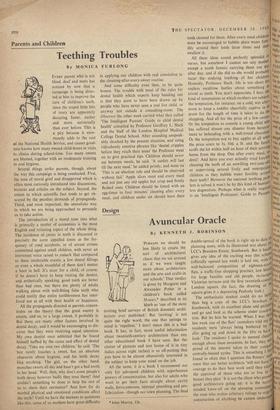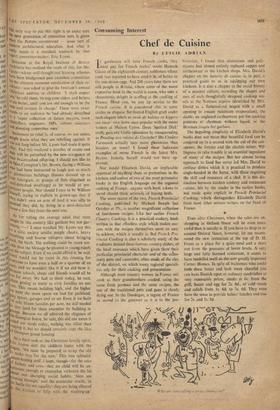Design
Avuncular Oracle
J. ROBINSON
By KENNETH
'PERHAPS we should be less likely to create the sort of architectural chaos that we see around us if we were taught more about architecture and the arts and crafts in our schools.' That verdict is given by Margaret and Alexander Potter in a children's book called Houses,* described in its blurb as 'one of the most of British domestic archi- inviting brief surveys tecture ever published.' But 'inviting' is not quite the right word; the one that springs to mind is 'repellent.' I don't mean this is a bad book. It has, in fact, more useful information about twentieth-century architecture than any other educational book I have seen. But the clutter of pictures and text (some of it in tiny italics across eight inches) is so off-putting that you have to be almost obsessively interested in the subject to keep your mind on the job.
All the same, it is a book I recommend not only for advanced children with superhuman powers of concentration, but also for adults who want to get their facts straight about cavity walls, ferro-concrete, internal plumbing and pre- fabrication—though not town planning. The final
•
* John Murray, 15s. gives any idea of the exciting way this sclact° double-spread of the book is right up to dale tin (officially opened last week) is laid out, with il5 planning news, with its illustrated text about tile LCC's Brandon Estate, Southwark. But it hard well-balanced composition of eighteens t& flats, a traffic-free shopping precinct, low b oct'5 for large families and old people, re-varlfted Victorian terraces and the first twentieth-cento0 London square. (In fact, the drawing of ihe square gives it a depressing Peabody look.) The enthusiastic student could do no than beg a copy of the LCC's brochur Southwark, with its excellent plans and pie' and go and look at the scheme under cons tion. But let him be warned. When I was last week one of the flats' caretakers told in residents were 'always being bothered b) elite going up and down in the lifts to ha look.' The residents I spoke to seemed che enough about these invasions. In fact, they proud of the interest taken in their coni centrally-heated eyries. This is something 1 found so often that I question the Potters' ' ment that our better architects 'will not ha" courage to do their best work until they re the approval of those who are to live ir houses they plan.' It is not the client who pre good architecture going up; it is the nal minded know-all on the planning commit the man who makes arbitrary rulings to stoP construction of anything he cannot unders ta The only way to put this right is to make' sure he next generation of committee men is given What the Potters recommend - - some sort of illodern architectural education. And what it reallY needs is a standard textbook by that exPett committee-basher, Erie Lyons.
Someone at the Royal Institute of British Architects has realised the truth of this, for Mr. 1-Y°tIs---who5e well-thought-out housing schemes 114Ve been bludgeoned past countless committees (I.0 the ultimate immense satisfaction of their re- ,:issdents)---was asked to give the Institute's annual Lnristmas address to children. 'I shall expect he told them, 'to nag your elders and betters 10 do better, until you are old enough to be the "ten and women in charge.- These were sweet to an audience he had already described a 'super collection of future mayors, town councillors, engineers, MPs, cabinet ministers 4nd planning committee men.'
Incitement to rebel is, of course, no use unless 1), °Pie know what they are rebelling against. It '‘,49 not long before Mr. Lyons had made it quite ear. And this weekend a number of mums and 'tads will be perturbed by the new arrogance of !len' brainwashed offspring. I should not like to De Miss Crompton 's Mr. Brown, facing a William !hn had been instructed to laugh just as much nt • pretentious buildings (houses dressed up to ,(3°k Georgian, or groups of flats disguised as ;cnit-detached dwellings) as he wou/d at pre- ise.n"us people. Nor should I care to be William "vartself, trying to explain to grown-ups that if 'Icy didn't own an acre of land it was silly to Phretend' they did, by living in a semi-detached use a few feet from the next one.
AS for telling the average adult that most Pre°Ple in this country like gardens: but not gar-• —! I once watched Mr. Lyons say this a civic society amidst purple cheeks, heavy breathing and hoarse whispers about bringing back the birch. Yet nothing: could be more sen- \II* than the Message he planted in young, minds 11,4 the subject. Even if we could affOrd it, he said, ere would not be room in this country for everyone to have even a half or a quarter of an 'CreI and we wouldn't like it if we did' have it, reause schools, shops and friends would all' be about far away. We had to think today, he said, °lit getting as many as sixty families on one ac.re• This meant building high, and the higher . Went the more space we had. for parkland, !au 13nees, garages and so on. Even if we built Jr- cs;t-' °nly.lifteen families per acre, we still needed lc", I) save land for these amenities by building in nstro' . enPs. Because we all admired the elegance of s the, h . -Jeorgian house, he said, this did not mean it tut kt, c s • our needs today;, nothing was sillier than PYing it, but we should certainly copy the idea tuiveaq Georgian group housing. heel" vie,f1 1 haP stolkor ave reeel in tIl As a final stab at the Christmas family spirit, IrLc I-Yons sent the children home with the 'We must be prepared to scrap the old make way 'for the new.' This was splendid, tatent-baiting stuff. I hope, though—for the sake . fathers and sons--that no child will be un- rtunate enough to remember verbatim. the bit b.°11I our changing social habits. 'Men are 211flutg through,' said the avuncular oracle, 'in he battle for sex equality: they are being allowed the kitchen to help with the washing-up.'



































 Previous page
Previous page